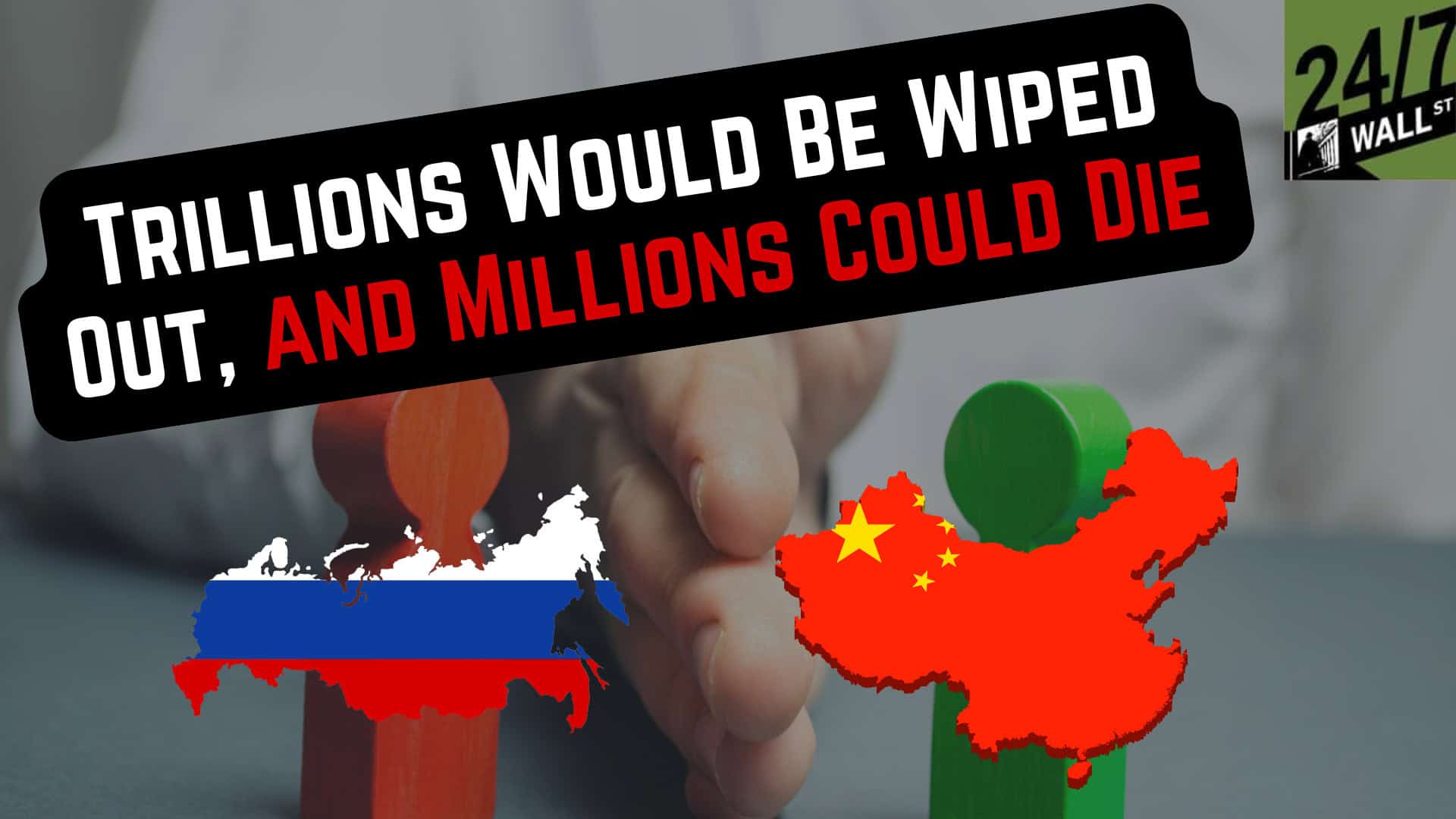
Key Points:
- Global Economic Impact: Simultaneous conflicts with Russia and China could severely disrupt the world economy.
- Sanctions’ Limitations: Sanctions may be less effective against China, as seen with Russia.
- Changing Power Dynamics: Non-aligned nations like BRICS are challenging Western dominance.
- One of the best ways to protect yourself in a downturn is high-quality dividend stocks. Smart money is scooping up these two dividend legends before word gets out.
Michael and Austin discuss the potential global implications if two superpowers, Russia and China, were simultaneously engaged in conflicts. They explore the catastrophic economic consequences, particularly if the U.S. chose to intervene in a Taiwan scenario. The conversation touches on the limitations of sanctions as a deterrent, especially given China’s economic resilience and the challenges of enforcement in an increasingly non-aligned world. They also consider the growing influence of the BRICS nations and how this could shift the global power structure.
Watch the Video
Edited Video Transcript:
[00:00:00] Austin Smith: Now, you know, we’ve looked at Ukraine, Russia, we’ve talked about China, Taiwan. Let’s go to the satellites view here, right? The orbit view of Earth very globally. Can the world afford two conflicts with two superpowers at once? You know, Russia, for all the ways that Ukraine has been admirably defending their own territory, is still a superpower.
[00:00:19] Austin Smith: They have a lot of nuclear weapons. They have a lot of people. There’s still a meaningful economy, a meaningful energy producer in the world. They can move the oil markets. China even more so. So can the world afford two conflicts with two superpowers where Russia and China are at war? And you know, we’re not sure who would be on the other side of a Chinese conflict, whether the United States would enter and support Taiwan or not.
[00:00:42] Austin Smith: But let’s just say, let’s just keep it just to Russia, China. Can the world afford two superpowers being conflict at once?
[00:00:49] Michael Muir: Well, the matter of the choice, I think, might be the first thing. Um, but I think, you know, it cannot be under understated that if the United States chose to intervene in a Taiwan scenario, the economic consequences would be utterly catastrophic.
[00:01:04] Michael Muir: Um, I couldn’t give you a specific figure, but I think it wouldn’t be a, it would be a fairly safe assumption to make that it would wipe trillions off of the world’s economy in a stroke. Um, it would have a huge disruptive, uh, impact. It would be hugely disruptive to global trade. Obviously, China, you know, is such an important, uh, economic powerhouse in the world.
[00:01:26] Michael Muir: Um, I think the problem for the United States, um, aside, you know, from the economic consequences, is how difficult it would be for, Kind of some of those non violent de escalation tactics that might be applied in other situations. For example, sanctions would have very little effect on China. Um, you know, China’s part of BRICS.
[00:01:49] Michael Muir: There’s a lot of non aligned nations that are simply not going to go along with that. You know, as we saw with, um, with Russia, the problem with sanctions is they’re very difficult to enforce. And nations that are dependent on Russian energy are not really going to stop doing business. That’s even more the case, um, in the US.
[00:02:05] Michael Muir: In a China scenario. So I don’t think sanctions are viable. Um, diplomatic solutions. I don’t think are really on the table either. Um, you know, obviously, China wants Taiwan back, so to speak, but the people of Taiwan are pretty clear that they don’t want to be under, uh, they don’t want to be under a regime ruled by Beijing.
[00:02:26] Michael Muir: Um, you know, the opinion polls are very clear on that. Um, you know, we could look at, for example, Hong Kong as a, uh, uh, A model to follow, but we’ve seen the problems with that. 1 country, 2 systems sounds good on paper, but then in practical terms, that’s often not the reality. Um, and I think that, you know, there’s no real, um, non, there’s no.
[00:02:50] Michael Muir: Simple peaceful solution is going to keep everybody happy. I think it’s the point to make their
[00:02:56] Austin Smith: right. And there is a case where it would seem that sanctions. It depends how you want to look at them. Have they been very effective against Russia? And Russia is hurting. There’s certainly a school of thought that believes that or there’s another school of thought that looks at and says they’ve been you.
[00:03:11] Austin Smith: Holy ineffective because there’s so many workarounds or other nations that would trade with them or cryptocurrencies or the minute, you know, the, the impact on the oil market, a lot of Russia to generate huge surpluses of capital Russia, also being notoriously opaque. It’s hard to know for sure, but suffice to say, it is not a clear answer.
[00:03:28] Austin Smith: And I think, you know, Christine Abley has a book on this. About the Russia sanctions and how far reaching they are. And yet we’re still seeing Russia able to conduct war three years in with Ukraine. So that it might not be the effective deterrent that we thought it would be, especially with China, who is, uh, way more, uh, Prepared financially than Russia.
[00:03:50] Austin Smith: They have, they have many more ways, many more economic trading partners, many more ways to weather sanctions. So even though sanctions might be a part of a tool of war, they certainly are not as effective as maybe proponents had hoped. And the Russia experience would seem to underscore that, that there is no clear answer whether or not they’ve truly been effective.
[00:04:06] Michael Muir: Yeah. It’s a difficulty enforcement, uh, and there are, you know, we’re looking at an increasingly non aligned world. Um, Where American influence maybe isn’t quite what it was and
[00:04:17] Austin Smith: true. Yeah, the emerging hope of the BRICS nation to counter Western powers is still very early, but very clearly what the ambition of that network of nations is.
[00:04:29] Austin Smith: And those are very powerful economically and resource rich nations. It really could affect the global power structure if they can take hold in the way as attended.
It’s Your Money, Your Future—Own It (sponsor)
Retirement can be daunting, but it doesn’t need to be.
Imagine having an expert in your corner to help you with your financial goals. Someone to help you determine if you’re ahead, behind, or right on track. With SmartAsset, that’s not just a dream—it’s reality. This free tool connects you with pre-screened financial advisors who work in your best interests. It’s quick, it’s easy, so take the leap today and start planning smarter!
Don’t waste another minute; get started right here and help your retirement dreams become a retirement reality.
Thank you for reading! Have some feedback for us?
Contact the 24/7 Wall St. editorial team.




